|
 In
1972, Lucille Pech was approached by then Mayor Joe Hoblit about
collecting items to form the Atlanta Museum. After that
conversation, Pech spearheaded an advisory committee composed of
Mayor Hoblit, Charlie Ott, Theresa Usherwood, Paul Gleason, Paul
Beaver, Les “Tiny” Sheridan and Bob Waldmeyer. In
1972, Lucille Pech was approached by then Mayor Joe Hoblit about
collecting items to form the Atlanta Museum. After that
conversation, Pech spearheaded an advisory committee composed of
Mayor Hoblit, Charlie Ott, Theresa Usherwood, Paul Gleason, Paul
Beaver, Les “Tiny” Sheridan and Bob Waldmeyer.
On July 4, 1973, a dedication was held to officially open the
museum. The Atlanta Public Library was still under the City of
Atlanta’s direction, and the museum was housed in the library’s
basement until 2008. Pech served as the museum’s curator and
director from 1973 until 2011.
In 1981, the family of Judge Frank S. Bevan gifted the building that
originally housed his law office to the city of Atlanta. The family
stipulated that it would be used by the library. This space served
as the museum annex until the library permanently moved the entire
museum to the Union Hall building (the Downey Building) in 2009. It
is still housed in Union Hall today.

Museum founder Lucille (Baker) Pech was born in rural
McLean, Illinois on February 12, 1918. She met Joseph Pech in 1835
during a Saturday night movie at Murphy Hall in Atlanta, Illinois.
The couple married six months later on January 24, 1936 at the
Atlanta Christian Parsonage. That same year, Mrs. Pech graduated
from McLean High School. Except for four years they spent in McLean,
the couple farmed in the Atlanta Township their whole married life.
The couple had three children, seven grandchildren and eight great
grandchildren. Lucille Pech passed away July 13, 2013, at the age of
95.

At the dedication ceremony, Atlanta Public Library President Connie
Wertheim welcomed everyone. She said she was thrilled so many people
were there to help celebrate Lucille Pech, who was the original
curator of the Atlanta Museum. Pech was important not only to
Atlanta, but also to Logan County Tourism and Route 66.
Before Wertheim shared more about Pech, she recognized Atlanta
Public Library Trustees present, who included Treasurer Heather
Chapman, Chis Colaw, and Savanah Langley. APL Vice-President Holly
Sanford, Secretary Karin McDowell and Trustee Jason Dean were unable
to attend. Wertheim then introduced Library Director Christina
Vannoy and Museum and Program Director Julianna Nordman. She thanked
all of them for their hard work in helping put this event together.
Pech was the first one to collect artifacts for the museum. During
her time as curator, Wertheim said Pech gathered over 2000 items for
the museum. One of her favorite duties was collecting newspaper
clippings and assembling them into scrapbooks.
Over the years, Pech was part of organizations such as the Abraham
Lincoln Tourism Bureau of Logan County. Due to Pech’s fondness for
tourists, her unofficial title was Route 66 grandma.
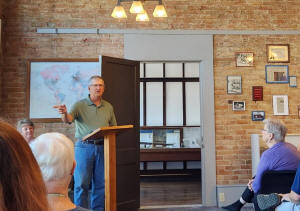
Next up was Dennis Smith, a friend and neighbor of the Pech family.
He said Pech loved learning history and teachings others about it.
Pech’s passion for history changed the future of Atlanta for all the
days to come. Her husband helped with many of her historical
projects.
Smith said Pech was a big part of his earliest childhood memories.
He recalls the whole neighborhood joining together to bale hay and
all the hard work it entailed. Everyone’s favorite time of day was
lunch.
One of Smith’s favorite stories about the Pech family is when he and
others helped the family while Joe Pech was in the hospital during
planting season. At the time, Smith and his brother Jim worked for
the Hoblit Seed Company. Smith, his brother and “Sunny” Howe, worked
together on the Pech’s ground and helped plant their corn.
The Pech family always brought their seed corn from Hoblit Seed
Company. One day, a seed salesman from a rival company stopped at
the Pech’s house to try and sell them seed. After Joe and Lucille
Pech listened to the sales pitch, Smith said they asked the salesman
if his company would help plant the seed corn if they bought it from
him. The salesman was quite taken aback by the question and
responded “no, you have to plant the corn yourself. Lucille Pech
told the salesman the people they bought seed corn from then also
planted it for them. It was the last time they ever heard from the
salesman.

The area where the Smith and Pech families farmed was
near Kickapoo Creek. Smith said the creek was a good place to find
arrowheads because the Kickapoo tribe used the creek for canoeing
and fishing.
As far as local history, Smith said Pech was extremely knowledgeable
about a town called Newcastle. Newcastle was located on the west
side of the Atlanta/Beason road.
The residents of Newcastle moved to Atlanta because of
transportation. Smith said when the railroad came through, it was
time to move. Pech had a photo of the first house moved from
Newcastle to Atlanta, which amazed Smith.
Another time, Pech asked Smith if he knew where Jolly Cemetery was.
Smith knew where Jolly Bridge was but had never heard about the
cemetery. Smith was amazed to find the cemetery was just a few
hundred yards from where he lived just north of Jolly Bridge. Pech
showed him the path to the cemetery, which was surrounded by trees.
Once Smith asked a professor why history is so important. Smith’s
professor told him that what we learn most from history is that we
don’t learn much from history.
Though Smith was puzzled at the time, he now knows if we don’t learn
from history, we will repeat mistakes of the past.
Those who built homes in Atlanta did not know Interstate 55 would
one day bypass the town. Smith said many towns flourished when the
main route went right through town. At one point before I-55 was
built, Atlanta had eight gas stations. When Route 66 moved out to
the edge of Atlanta and I-55 was built, Smith said Atlanta suffered
greatly.
People now come to Atlanta from all over the world to see the past
because Route 66 goes through Atlanta. Smith said the history Pech
recovered 50 years ago is coming alive today.

Wes Green, Shawn Green and Becky Green-Hembrough, the grandchildren
of Lucille Pech, then shared some of their memories of their
grandmother.
Something Wes Green said his grandmother loved was
her job at the museum. Pech loved explaining history to groups who
came through town. Wes recalls that Pech could communicate even with
people who did not speak much English. He said his grandmother was
very patient.
[to top of second column] |

Shawn Green said his family was fortunate enough to
live on the Pech’s farm. When Shawn was little, he remembers going
to work with his grandmother and seeing all the visitors at the
museum. His grandmother would take her time explaining everything to
people there and light up as she explained it.
From his grandmother Lucille, Shawn learned how to ask in depth
questions and also developed a passion for history. He said she
emphasized both the good and bad parts of history, which is a
perspective he really appreciates. It is how Shawn learned to be
inquisitive about both the good and the bad.
One memory Becky has is of eating lunch and playing on the front
lawn of the museum in the 1970s. Becky remembers going to work with
her grandmother. She would help her grandmother clean the museum
basement and could see her grandmother’s passion for the artifacts
down there. When they were done cleaning, Becky remembers getting
treats like a big Three Musketeers candy bar.
Additionally, Becky remembers her grandmother’s caring and
compassion for the community. Pech was the community genealogist and
could help people learn their family history. Becky takes great
pride in her grandmother’s legacy, which has been passed down
through the family.
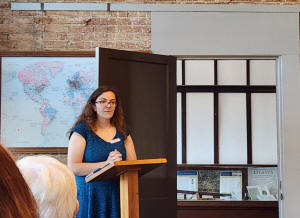
Atlanta Public Library Museum Director Julianna Nordman shared about
the future of the museum, which she has worked at since 2021.
Nordman’s grandparents taught her to appreciate history and
storytelling. Her grandfather recalls when Palms Grill was a
restaurant.
There are many in the community Nordman said she has learned from.
Though she never met Pech, Nordman has heard many stories about her.
Nordman feels Pech’s presence when she looks through the research
and many scrapbooks [Pech put together].

One thing Nordman hoped Pech’s family knew is how
important Pech was to the past, present and future of the community.
Nordman appreciates how supportive the community is of the museum.
Recently, Nordman said the museum received a significant monetary
donation. Because of the donation, Nordman plans to interview people
about what makes Atlanta special. The interviews will be used to
expand Nordman’s knowledge and bring in better exhibits.
In addition, Nordman wants to update and digitize the photograph
collection and Pech’s genealogy research. She hoped everyone could
see how important Pech was to the museum.
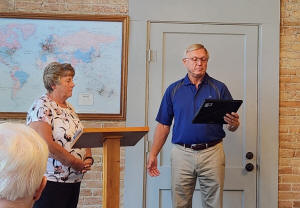
Atlanta Mayor Adam McVey was the next to speak. McVey said he felt
privileged to speak and thanked Smith and Pech’s grandchildren for
sharing their stories. McVey has fond memories of Pech and said his
boys mowed the library’s lawn.
Tourism and history have continued to grow in Atlanta, which McVey
said is important as people travel Route 66. He credits Pech with
beginning tourism in Atlanta.
When people come off the interstate, McVey wants to get them into
the town to spend money on local businesses.
McVey then presented Connie Wertheim with a Proclamation declaring
Saturday, September 9, 2023, as Lucille Pech Day in honor of her
service to community and the museum.
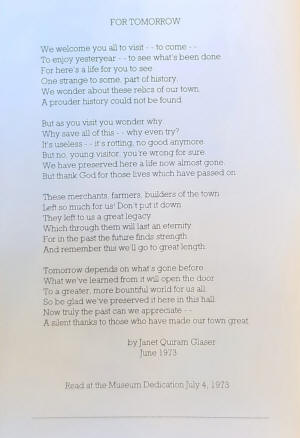
In dedication of the memorial wall, Wertheim read the poem “For
Tomorrow” written by Janet Quiram Glaser in June 1973. Wertheim said
the poem was originally read at the museum dedication on July 4,
1973. She believes the poem best describes Lucille Pech’s philosophy
about the museum.
The poem talks about inviting people to come enjoy yesteryear and
see the relics of the town. One line says, “we have preserved here a
life now almost gone.” It also refers to how the “merchants, famers
[and] builders of the town/[l]eft so much for us.” It is a great
legacy that will last because “in the past the future finds
strength.”

The poem closes by saying:
Tomorrow depends on what’s gone before. What we’ve learned from it
will open the door To a greater, more bountiful world for us all. So
be glad we’ve preserved it here in this hall. Now truly the past can
we appreciate-- A silent thanks to those who have made our town
great.
As the dedication drew to a close, Wertheim said Atlanta was blessed
by Pech’s dream for the museum 50 years ago. Wertheim then thanked
her daughter Amy Wertheim and others for their help putting
everything together for the dedication.
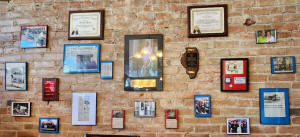
Once the dedication was over, everyone was invited to enjoy some
refreshments. People could also look at the memorial wall with
photos of Lucille Pech and newspaper clippings about her work with
the museum. Another room had more newspaper clippings and the
scrapbooks Pech put together over the years.
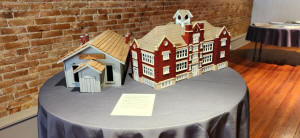
A notable artifact was two miniature buildings made by Joe Pech. One
was Murphy Hall where Lucille and Joe Pech met. The other was
Atlanta High School
The museum plans to continue to carry on Lucille Pech’s legacy by
sharing the town’s history.
[Angela Reiners] |